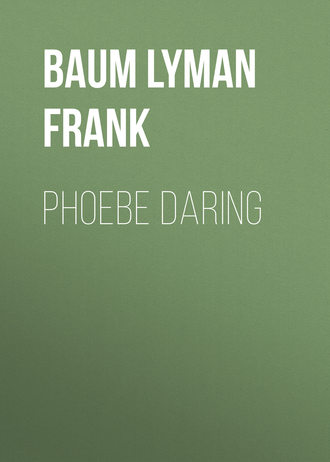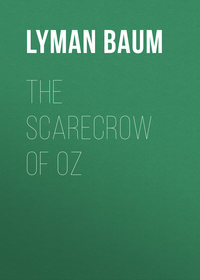 полная версия
полная версияPhoebe Daring
“Father says the woman was as good as a vaudeville,” continued Nathalie, clicking out the words, “but not quite so circumspect – so you can imagine the scene! She is said to be rich and prosperous, but was furious over her loss and threatened Mr. Spaythe with so many horrible penalties, unless he restored her property, that he had to take refuge inside the bank and lock the door on her.”
This was merely such gossip as Phoebe had heard from Don, but it was interesting to have the details from another viewpoint.
To understand the excitement caused by the disappearance of Mrs. Ritchie’s box it is only necessary to remember that Riverdale is a sleepy old town where anything out of the ordinary seldom happens. In a big city such an occurrence would be a mere detail of the day’s doings and the newspapers would not accord it sufficient importance to mention it in a paragraph; but in Riverdale, where a humdrum, droning life prevailed, the mysterious incident roused the entire community to a state of wonder and speculation. The theft, or loss, or whatever it was, became indeed the “talk of the town.”
The principals in the scandal, moreover, were important people, or as important as any that Riverdale possessed. Mrs. Ritchie owned one of the largest plantations – or “farms” – in the neighborhood, left her long ago by her deceased husband; Mr. Spaythe was the local banker; Judge Ferguson had been known and highly respected far and wide. Therefore the weekly newspaper in the town was sure to print several columns of comment on the affair, provided the tipsy old compositor employed by the editor could set so much type before the paper went to press.
The following morning Phoebe walked over to see Janet and found that the Fergusons were face to face with a new and serious trouble. It was true that the Ritchie box had vanished and no one could imagine where it had gone to.
“Papa was very orderly, in his way,” said Janet, “and he had a book in which he kept a complete list of all papers and securities in his care and a record of whatever he delivered to the owners. Mrs. Ritchie’s account shows he had received money, bonds and mortgages from her, amounting in value to several thousand dollars, and these were kept in a heavy tin box painted blue, with the name ‘Ritchie’ upon it in white letters. With many similar boxes it was kept in the oak cupboard at the office, and my father always carried the keys himself. We gave these keys to Mr. Spaythe because we knew he was father’s executor, and he found all the boxes, with their contents undisturbed, except that of Mrs. Ritchie. It is very strange,” she added, with a sigh.
“Perhaps the judge removed it from the cupboard just before his – his attack,” said Phoebe. “Have you searched the house?”
“Everywhere. And it is not among father’s papers at the bank. One of the most curious things about the affair,” continued Janet, “is that Mrs. Ritchie came to the house the very day after father’s death to demand her box, and she was so insistent that I had to send for Toby Clark to take her away. No one else bothered us at all; only this woman whose property was even then missing.”
“Are you sure she didn’t go to the office and get the box?” asked Phoebe, suddenly suspicious of this queer circumstance.
“Why, she hadn’t the keys; nor had Toby. Mr. Spaythe found the cupboard properly locked. On the bunch of small keys which father carried is one labelled ‘Ritchie,’ and it proved there was a complicated lock on the box which could not have been picked.”
“That’s nothing,” returned Phoebe. “Whoever took the box could break it open at leisure. It was merely tin; a can-opener would do the job.”
“Yes; I’m sure that was why the entire box was taken away. It was the only one that contained money to tempt a thief. Mrs. Ritchie, for some reason, never trusted banks. She has some very peculiar ideas, you know. Whenever she needed money she came to father and got it out of the box, giving him a receipt for it and taking a receipt when she deposited money. The record book shows that she had about three thousand dollars in currency in her box when it – disappeared; and there were government bonds for several thousands more, besides notes and mortgages and other securities.”
“Can she hold you responsible for this property?” inquired Phoebe.
“Mr. Spaythe says that she can, but he is confident she will not attempt to collect it from us. He was here this morning and had a long talk with mother. He assured her the box will surely be found in time, and told her not to worry. We are liable to suffer our greatest annoyance from Mrs. Ritchie, who won’t be patient and wait for an investigation. The woman is very nervous and excitable and seems to think we are trying to defraud her.”
“I – I don’t suppose there is anything I can do?” said Phoebe helplessly.
“No, dear; nothing at all. Mr. Spaythe says not to pay any attention to Mrs. Ritchie and has asked us not to talk about the affair until the mystery is solved. If anyone asks questions we must refer them to Mr. Spaythe. So you mustn’t repeat what I’ve told you, Phoebe.”
“I won’t. Don says Mrs. Ritchie went away with Lawyer Kellogg last night.”
“I suppose Mr. Kellogg would like to take her case and make us all the trouble he can,” replied Janet bitterly.
“Why doesn’t Mr. Spaythe see Mr. Holbrook?” asked Phoebe.
“I don’t know. Perhaps he has seen him. Anyhow, I’m sure Mr. Spaythe will do everything in his power to find the box. He was one of father’s best friends and we know him to be an honorable man and very capable in all ways. We feel that we may trust Mr. Spaythe.”
Phoebe did not reply to this. She was wondering if anyone could be trusted in such a peculiar complication.
CHAPTER V
HOW PHOEBE INTERVIEWED THE LAWYER
Phoebe Daring returned home more mystified than ever in regard to the missing box. The girl was by nature logical and inquiring and aside from the interest she felt in the Fergusons the mystery appealed to her curiosity and aroused in her a disposition to investigate it on her own account. That day, however, there was no development in the affair. Mrs. Ritchie kept out of sight and aside from the gossip indulged in by the villagers concerning the discreditable scene at the bank the night before, the excitement incident to the loss of the precious blue box seemed to have subsided. Don and Becky reported that all the school children were talking about the lost box and that many absurd statements were made concerning its disappearance.
“I had to punch one of the fellows for saying that Judge Ferguson spent Mrs. Ritchie’s money and then committed suicide,” announced Don. “He took it back, afterward, and said that Kellogg robbed the judge for revenge. There may be some truth in that, for Kellogg paid his board bill the other day. Another kid said he dreamed it was Will Chandler, the postmaster, who cut a hole through the ceiling of the post office and so got into the judge’s cupboard. Nearly everybody in town is accused by somebody, they say, and I wouldn’t be surprised to hear that I stole the box myself.”
“I don’t believe there was any box,” muttered Becky. “Ol’ Mam Ritchie’s half crazy, an’ I guess she just imagined it.”
“Wake up, Beck,” said Don; “you’re dreaming.”
“That proves I’ve a brain,” retorted his sister. “No one can dream who hasn’t a brain; which is the reason, my poor Don, you never dream.”
“He snores, though,” declared Sue.
“I don’t!” cried Don indignantly.
“You snore like a pig; I’ve heard you.”
“Never!”
“I’ll leave it to Becky,” said Sue.
“If she sides with you, I’ll pinch her till she’s black-an’-blue,” promised Don angrily.
“I dare you,” said Becky, bristling at the threat.
“Now – now!” warned Phoebe; “there’ll be a fight in a minute, and some one will be sorry. Cool off, my dears, and don’t get excited over nothing. Have you got your lessons for to-morrow?”
At nine thirty next morning Janet Ferguson stopped at the house, as she had promised to do, and Phoebe put on her things and joined her friend on the way to town, to interview Mr. Holbrook.
“Any news?” asked Phoebe.
Janet shook her head.
“We haven’t heard from Mr. Spaythe since I saw you. Mother’s dreadfully nervous over the thing, which followed so soon after father’s death. I hope Mrs. Ritchie’s box will be found, for it would relieve us both of much anxiety.”
“I hope so, too,” replied Phoebe.
When they arrived at the well-known stairway leading to the offices which Judge Ferguson had occupied for so many years, Janet was rather shocked to find a showy new sign suspended above the entrance. It bore the words: “JOHN HOLBROOK, Attorney at Law,” and another but smaller tin sign was tacked to the door at the head of the stairs.
Phoebe knocked and a voice bade them enter. Mr. Holbrook was seated at a table with several law books spread open before him. But he sat in an easy attitude, smoking his cigarette, and both the girls decided the array of legal lore was intended to impress any clients who might chance to stray into the office.
“I am Miss Ferguson,” said Janet in stiff and formal tones. He bowed and tossed his cigarette through the open window, looking at Janet rather curiously and then turning to Phoebe. “Miss Daring, sir.”
He bowed again, very courteously, as he placed chairs for them. Somehow, they felt relieved by his polite manner. Neither had expected to find so young a man or one so handsome and well dressed and it occurred to Phoebe to wonder why Mr. Holbrook had selected this out-of-the-way corner, where he was wholly unknown, in which to practice law. Riverdale was normally an exceedingly quiet town and possessed few attractions for strangers.
Janet began the conversation.
“We have come to see you in regard to Toby Clark,” she said. “He was in my father’s employ for several years, first as office boy and then as clerk, and Judge Ferguson thought very highly of him and trusted him fully. Toby injured his foot a year ago and limps badly, but that doesn’t interfere much with his activity, and so we thought – we hoped – ”
She hesitated, here, because Mr. Holbrook was looking at her with an amused smile. But Phoebe helped her out.
“Toby is without employment, just now,” she explained, “and we believe it will be to your advantage to secure him as an assistant.”
“The young man has already applied to me,” said the lawyer. “I was obliged to decline his application.”
“I know,” said Phoebe; “but perhaps you did not realize his value. Toby is very popular in Riverdale and knows every one of Judge Ferguson’s former clients personally.”
“I do not need a clerk,” returned Mr. Holbrook, rather shortly.
“But you are a stranger here and you will pardon my saying that it is evident you wish to secure business, or you would not have opened a law office. Also you are anxious to succeed to Judge Ferguson’s practice, or you would not so promptly have rented the office he had occupied. Nothing will help you to succeed more than to employ Toby Clark, who was the judge’s old clerk and knew a good deal about his law business. Toby is as much a part of the outfit of this office as the furniture,” she added with a smile.
“I thank you for your consideration of my interests,” said Mr. Holbrook.
Phoebe flushed.
“I admit that we are more interested, for the moment, in Toby Clark,” she replied. “Like everyone else in Riverdale who knows the boy, we are fond of him, and so we want him to have the opportunity to continue his studies of the law. He is very poor, you know, and cannot afford to go to college just yet; so nothing would assist him more than for you to employ him, just as Judge Ferguson did.”
Mr. Holbrook drummed with his fingers on the table, in an absent way. He was evidently puzzled how to answer this fair pleader. Then he suddenly straightened up, sat back in his chair and faced the two girls frankly.
“I am, as you state, an entire stranger here,” said he, “and for that reason I must tell you something of myself or you will not understand my refusal to employ Toby Clark. I – ”
“Excuse me,” said Janet, rising; “we did not intend to force your confidence, sir. We thought that perhaps, when you were informed of the value of my father’s clerk, you might be glad to employ him, and we would like to have you do so; but having presented the case to the best of our ability we can only leave you to decide as you think best.”
“Sit down, please, Miss Ferguson,” he replied earnestly. “It is indeed to my advantage to make friends in Riverdale, rather than enemies, and as I am unable to employ Toby Clark you are likely to become annoyed by my refusal, unless you fully understand my reasons. Therefore I beg you will allow me to explain.”
Janet glanced at Phoebe, who had remained seated. Her friend nodded, so Janet sat down again. The truth was that Miss Daring was curious to hear Mr. Holbrook’s explanation.
“I’ve had my own way to make in the world,” began the young man, in a hesitating, uncertain tone, but gathering confidence as he proceeded. “There was no one to put me through college, so I worked my way – doing all sorts of disagreeable jobs to pay expenses. After I got my degree and was admitted to the bar I was without a dollar with which to begin the practice of law. Yet I had to make a start, somehow or other, and it occurred to me that a small town would be leas expensive to begin in than a city. During the past summer I worked hard. I don’t mind telling you that I tended a soda-fountain in St. Louis and remained on duty twelve hours a day. I earned an excellent salary, however, and by the first of October believed I had saved enough money to start me in business. Seeking a small and desirable town, I arrived in Riverdale and liked the place. While hesitating whether or not to make it my permanent location, Judge Ferguson died, and that decided me. I imagined I might find a good opening here by trying to fill his place. I rented these offices and paid a month’s rent in advance. I purchased this furniture and the law library from Mr. Spaythe, the executor, and partly paid for it in cash. My board at the hotel is paid for up to Saturday night, and I had some letterheads and cards printed and my signs painted. All this indicates me prosperous, but the cold fact, young ladies, is that I have at this moment exactly one dollar and fifteen cents in my pocket, and no idea where the next dollar is coming from. Absurd, isn’t it? And amusing, too, if we consider it philosophically. I’m putting up a good front, for a pauper, and I’m not at all dismayed, because I believe myself a good lawyer. I’ve an idea that something will occur to furnish me with a paying client in time to save the day. But you can readily understand that under such circumstances I cannot employ a clerk, even at a minimum salary. I must be my own office-boy and errand-boy until my living expenses are assured and I can see the week’s wage ahead for my assistant. And now, Miss Ferguson and Miss Daring, you have the bare facts in the case and I hope you will be able to forgive me for refusing your request.”
The girls had listened in some amazement, yet there was little in Mr. Holbrook’s ingenuous statement to cause surprise. Such a condition was easily understood and quite plausible in this aggressive age. But the story affected the two girls differently. Janet developed an admiration for the bold, masterful way in which this impecunious young fellow had established himself. Such a combination of audacity and courage could scarcely fail to lead him to success.
Phoebe, on the other hand, thought she detected a false note running through the smooth recital. It seemed to her that Mr. Holbrook had either invented the entire story on the spur of the moment or was holding something back – perhaps both – for reasons of his own. She did not doubt the main point of the story, that he was absolutely penniless and dependent upon the uncertainties of his law business for a living; but she felt sure he had not confided to them his actual history, or any important details of his past life. She reflected that this young fellow wore expensive clothes and that every detail of his apparel, from the patent-leather shoes to the white silk tie with its jeweled stick-pin, denoted extravagance rather than cautious economy, such as he had claimed he had practiced. A silk-lined overcoat hung upon a peg and beside it was a hat of better quality than the young men of Riverdale wore. A taste for expensive clothes might be a weakness with the lawyer, and while Phoebe hesitated to condemn him for the endeavor to present a prosperous appearance she could not help thinking he would have saved a good deal more money as soda-water clerk had he been content with more modest attire. Imagine dapper Mr. Holbrook a soda-water clerk! Phoebe was almost sure that was one of the inventions. Yet she, as well as Janet, admitted the frank and winning personality of the young lawyer and felt she knew and appreciated him better since listening to his story.
“Of course,” continued Holbrook, a little anxiously, “this confidence places me at a disadvantage in your eyes. If Riverdale knows me as you do I shall be ruined.”
“We shall respect your confidence, sir,” said Janet, less stiffly than before, “and we now fully understand why you cannot, at present, employ Toby Clark. Perhaps, by and by – ”
“If I succeed, I shall give Toby the first job in my office,” he promised earnestly.
“Thank you, sir. Come, Phoebe.”
But Phoebe again refused to stir. She was pondering something in her mind and presently gave it expression.
“Toby Clark,” said she, “injured his foot while endeavoring to serve the family fortunes of the Darings, so we are really under serious obligations to the boy. But he is so proud and shy, Mr. Holbrook, that were we to offer him assistance at this crisis in his affairs, he would be hurt and humiliated. And he would refuse to accept any help that savored of charity.”
Mr. Holbrook nodded, smiling at her.
“I understand that disposition, Miss Daring,” said he, “for I have similar qualities of independence myself.”
“Yet something must be done for Toby,” she continued, “or else the boy will lose all the advantages of his former association with Judge Ferguson and perhaps starve or freeze when the cold weather comes on. From your explanation, sir, and the promise you have just made to Miss Ferguson, I understand your sole reason for not employing Toby is the lack of money with which to pay his wages. Is that correct?”
“Entirely so, Miss Daring. I appreciate the advantages of having this young fellow with me, since he is so well acquainted hereabouts and is somewhat posted in Mr. Ferguson’s business affairs; but – ”
“Then,” said Phoebe, “we must organize a conspiracy, we three, and help Toby without his ever suspecting it. We Darings are not wealthy, Mr. Holbrook, but we have more means than we absolutely require and it will be a great pleasure to us to pay Toby Clark’s salary as your clerk until you become prosperous enough to pay it yourself. Judge Ferguson was not over-liberal in the matter of wages and gave Toby but five dollars a week in money; but he also gave him a wealth of kindly sympathy and much assistance in the study of law. I want you to hire Toby at the same wages – five dollars a week – and try to assist him at odd times as the judge did. No one but we three shall ever know how the wages are supplied, and especially must the secret be guarded from Toby. What do you say to this proposition, Mr. Holbrook?”
Janet was filled with admiration of this clever idea and looked appealingly at the young man. Mr. Holbrook flushed slightly, then frowned and began drumming on the table with his fingers again. Presently he looked up and asked:
“Will this arrangement be a source of satisfaction to you young ladies?”
“It will give us great pleasure,” declared Phoebe.
“And it will be splendid for Toby,” added Janet.
“Do you also realize that it is an assistance to me – that it will add to the false evidences of my prosperity?” inquired the young man.
“Oh, I was not considering you at all,” said Phoebe quickly, fearing he might refuse. “I was only thinking of Toby; but if you find any advantage in the arrangement I hope it will repay you for your kindness to our friend – and to ourselves.”
Mr. Holbrook smiled. Then he nodded cheerfully and replied:
“It would be very ungracious of me to say no, under such quaint conditions, and therefore we will consider the matter as settled, Miss Daring.”
“I will send you a check for twenty dollars, which will be four weeks’ wages for Toby, in advance,” she said. “And each month I will send you twenty more, until you notify me you are able to assume the obligation yourself.”
He shook his head, still smiling.
“Send me five dollars each week,” said he. “Otherwise, in my present circumstances, I might be tempted to spend Toby’s wages on myself.”
“Very well, if you prefer it so.” Then, half turning toward the door, she added: “I thank you, Mr. Holbrook. Your coöperation in this little conspiracy of mine has relieved me of a great anxiety; indeed, it will give pleasure to all who know Toby Clark and are interested in his welfare. I shall not forget that we owe you this kindness.”
He bowed rather gravely in acknowledgment of this pretty speech and then they heard hasty steps mounting the stairs and the door opened abruptly to admit Mr. Spaythe.
CHAPTER VI
HOW TOBY CAME TO GRIEF
The banker of Riverdale was perhaps the most important personage in the community, not even excepting Will Chandler. A man of considerable wealth and sterling character, Mr. Spaythe was greatly respected by high and low and was deemed reliable in any emergency. In character he was somewhat stern and unyielding and his sense of justice and honor was so strong that he was uncharitably bitter and harsh toward any delinquent in such matters. As an old friend of the late Judge Ferguson he had accepted the responsibilities of administering his estate and was engaged in fulfilling his duties with businesslike celerity and exactness when the unpleasant incident of Mrs. Ritchie’s missing box came up to annoy him. Mr. Ferguson’s affairs were in perfect order; Mr. Spaythe knew that the box had disappeared since his demise; but the affair required rigid investigation and the banker had undertaken to solve the mystery in his own way, without confiding in or consulting anybody.
Mr. Spaythe was usually so deliberate and unexcitable in demeanor that his sudden entrance and agitated manner made both the girls, who knew him well, gasp in astonishment. He seemed to be startled to find them in young Mr. Holbrook’s office and his red face took on a deeper glow as he stared first at one and then at the other.
“We were just going,” said Phoebe, understanding that Mr. Spaythe had come to see the lawyer, and then both the girls bowed and turned toward the door.
“One moment, please,” said the banker earnestly, as he held out an arm with a restraining gesture. “A most extraordinary thing has happened, in which you will doubtless be interested. Mrs. Ritchie has just had Toby Clark arrested for stealing her box!”
Phoebe sank into a chair, weak and trembling, and as she did so her eyes swept Mr. Holbrook’s face and noticed that it flushed scarlet. But the wave of color quickly receded and he turned a look of grave inquiry upon Mr. Spaythe.
“How absurd!” exclaimed Janet indignantly.
“Yes, it is absurd,” agreed the banker, in a nervous manner, “but it is quite serious, as well. I am sure Toby is innocent, but Mrs. Ritchie has employed Abner Kellogg as her counselor and Kellogg would delight in sending Toby to prison – if he can manage to do so.”
“That box must be found!” cried Phoebe.
Mr. Spaythe frowned.
“It has been found,” he rejoined bitterly.
“Where?”
“In a rubbish-heap at the back of Toby Clark’s shanty, down by the river. It is Mrs. Ritchie’s box, beyond doubt; I have seen it; the cover had been wrenched off and – it was empty.”
The two girls stared at one another in speechless amazement. Mr. Holbrook stood by his table, watching them curiously, but he did not seem to share their astonishment. Mr. Spaythe sat down in a chair and wiped his forehead with a handkerchief.
“Who arrested Toby?” asked Janet.
“Parsons, the constable. The warrant was issued by Powell, a justice of the peace, on a sworn statement made by Mrs. Ritchie and Abner Kellogg.”









